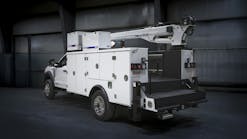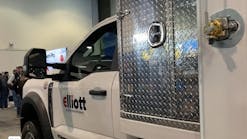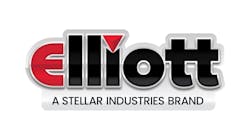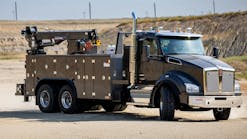All contractors who get out of bed in the dark of night to head off to the work site have at least one thing on their mind: get as much work done as is safely possible at the lowest cost. Every one of them has their own strategy to accomplish that. One thing most would agree upon, though, is that keeping their equipment running (and running efficiently) is paramount.
The key to that, many insist, is regular maintenance. A long roster of manufacturers and equipment dealers has keyed into this fact to improve their own bottom line. Ingersoll Rand and others offer year-long service kits, with all the fluids, filters and other regularly replaced parts — along with a suggested schedule — delivered en masse to dealers and end-use customers. The challenge to that, of course, is where to store a year's worth of service supplies. Another problem arises after contractors have gotten into the package a few dozen times and it becomes a pile of containers and part boxes.
Another challenge to equipment maintenance is competence. These days, most car owners won't (or can't) change their own oil. It's no different for contractors. Today machines are more productive but also more complex. While an experienced operator, with some basic training, can do a walk around, most could only perform simple servicing, like adding fluids. Considering what an expert operator is paid, that's hardly a profitable use of their time.
In comes the professional service techs, whatever their titles. Their job is to keep the equipment running efficiently and to quickly repair machines that have broken down. They have many tools at their disposal — literally — but one of the mainstays is the service vehicle. Whether a crane-mounted vehicle with cabinets for storing parts and space for fluid containers or a lube vehicle that can drain and fill an excavator's fluid reservoirs in minutes, these machines save time, money and equipment value.
Many large contractors have their own service vehicles as an important component of their fleet. Smaller operations either rent service equipment for big jobs or depend on the equipment dealer, or other businesses, to provide regular and on-demand service.
Road Machinery & Supplies Company (RMS) — a Des Moines, Iowa, sales and rental operation that mainly handles Kobelco equipment — offers a good range of rental and for-sale service equipment. They also provide maintenance to their rental and equipment sales customers.
Steve Metz, RMS shop foreman, manages much of the service and repair work that takes place in the dealership's shop and on its lot. He's also seen to it that a lot of service vehicles make it out of the yard to provide maintenance to their customers (rented and owned).
Recently, RMS used their own LubeMate lube trailer to service a GOMACO paver on a job site in north Des Moines. RMS owns two LubeMates, one in Des Moines and another at their Mason City, Iowa, operation. The Mason City lube trailer basically stays on their yard to service their own equipment. Metz said there are five service techs that can take the trailer out to a job site for equipment maintenance. Why do they like the lube trailer?
"They don't have to haul five-gallon buckets of oil to the equipment," Metz points out. "They fill up the new oil tank and other new fluid tanks, then run it out to the site." It also saves time, not just sweat. Like most lube vehicles, the trailer can suck the oil out of a machine and into the waste fluid tank, then pump oil into the reservoir in less time than letting it run out into an oil pan. The machine is back to work in no time. That's good for the contractor and for the RMS service tech hauling the trailer that day. He's off to the next customer that much sooner.
Used oil goes to an oil recycling company. Some companies pay to have waster oil hauled away, and some have companies pay them for their waste oil and sell it to recyclers and other end users.
The LubeMate trailer was custom built by Valley Engineering, Inc. (VE), of Hastings, Neb. VE has been providing custom-built equipment for nearly 30 years, including custom-designed trucks, trailers and skids. The LubeMate line specifically incorporates lubricant transportation, storage and disposal.
The company is a family business, with Bryan Hayes as co-owner and president, and his son Rob as vice president of operations. Jason Vertin is vice president of sales. A staff of five to 10 (depending upon current demand) includes assemblers, metal workers, painters, welders, and other personnel.
Hayes got into lube products in 1992. He noted that many jobs don't justify a dedicated lube truck and operator. He saw a trend with rental companies, dealers and contractors to find other solutions. One solution: the LubeMate lube skid. This allowed smaller operations to have a field lubrication system that could be added to a fleet without purchasing an additional truck. Mounted on a platform (skid), the lube skid can be lifted onto a fleet truck when needed or stored when not in use. It can also be permanently installed.
"The lube skid mounted in a service truck allows for minor adjustments, machine inspections and repairs," Hayes observes. "The skids are set up to handle the waste lubricants in a safe, professional manner as well as dispense new lubricants."
Rob Hayes is currently managing most of the daily operations of the business and will ultimately be taking over all responsibilities at a time to be determined; that is, when and IF his father retires. They co-own the company together right now. Rob stresses that VE is a custom manufacturer of all products.
"While we would prefer to build something that is standard or in our engineered line, often times everyone wants something just a little different," he stresses. "That is where we set ourselves apart. We can custom design units to the end user and deliver them faster than anyone in the industry.
"Valley Engineering was built on the custom-manufacturing and design platform and we intend to embrace that uniqueness going forward," said Rob Hayes. He adds, "We are positioned well to handle 'one-off' projects as well as large-volume production runs. We are now in the process of setting up a distributor network to expand our reach as well."
Rob and his father are very proud of their customer service and support. Rob notes that they "still maintain 1992 customers" and enjoy a great deal of repeat business.
Vertin handles much of the pricing of customer work. He will work with a prospective customer on the needs and specifications of a particular project. Using a new design and quoting software, he can often come back with technical specs and a firm quote within 24 hours. As Rob Hayes would say, "Quote it and deliver it fast!"
The productivity and safety of a job site depend on durable and efficient machine operation. With equipment service so vital to the success of a construction project or contactor, why is it so often overlooked?
Bryan Hayes offers his own opinion, "Everyone assumes preventive maintenance is preformed by the other guy."




